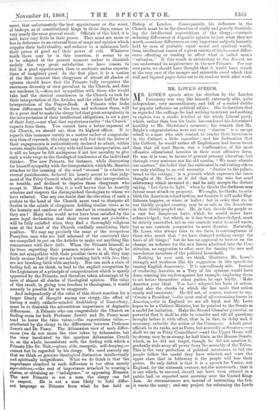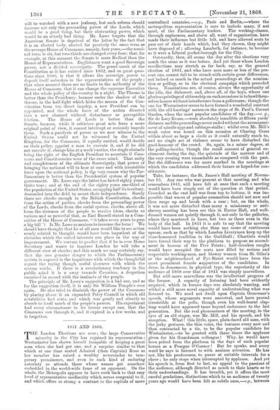MR. LOWE'S SPEECH.
MR. LOWE'S speech after his election by the London University was very like himself, extremely able, quite independent, very unconciliatory, and full of a rooted dislike for popular influence on political affairs. His declaration that as regarded the suffrage he had nothing to retract and nothing to explain was a stroke levelled at the whole Liberal party, which, rather than lose his brain, has condoned his determined hostility to Mr. Gladstone's measure ; his remark that Mr. Bright's congratulations were not very sincere " is a savage rebuff to a man who only wanted to render their intercourse in the Cabinet a little smoother ; and his declaration that like Cobbett, he would rather all Englishmen had bacon to oat than that all read Bacon, was a reaffirmation of his most offensive educational heresies in their most offensive form. He was, it is true, in favour of general primary education, but through every sentence ran his old maxim, " We must educate our masters," the belief that the cultivated in cultivating others are only yielding to an evil necessity. " Justice to the palace, bread to the cottage," is a, proverb which expresses the inner thought of Mr. Lowe, as it did that of the wise but cruel aristocracy which invented it ; and he only accepts the diviner saying, "Let there be light," when ho thinks the darkness may favour some attack on property. We ought, he thinks, to esta- blish the American school system, not because it will make Eng- lishmen happier, or wiser, or holier ; but in order that we, in our thickly peopled country, may be as safe as the Americans in their thinly peopled one. He, in fact, dreads the people as a vast but dangerous force, which he would never have acknowledged ; but which, as it has been acknowledged, must be strictly controlled, not as one controls water to avoid waste, but as one controls gunpowder to avert disaster. Naturally, Mr. Lowe, who always tries to see facts, is contemptuous of those who assert that " we have changed nothing except the basis of all things ;" but he has no approval to bestow on the change, no welcome for the new forces admitted into the Con- stitution, no suggestion to offer, save for taming the new and unwelcome members of the political household.
Nothing he ever said, we think, illustrates Mr. Lowe's strength and weakness like his suggestion in this speech for taming English democracy. It is marvellously able. Instead of traducing America, as a Tory of his opinions would have done, warning his readers against her example, imploring them to set before themselves other guides, he says boldly, Make America your ideal. You have adopted her basis of action, adopt also the checks by which the has made that action steady and consistent.' He did not, of course, venture to say, Create a President,'—the most real of all restraining forces in America,—for in England we are all loyal, and Mr. Lowe hopes to be a Cabinet Minister, but he pointed to the Senate as a model for imitation. Make the Second Chamber powerful, so powerful that it shall be able to consider and sift all questions brought before it with effect, that is, in fact, to delay and, if necessary, enfeeble the action of the Commons. Admit great officials to its ranks, not as Peers, but avowedly as Senators,—or shall we say as Privy Councillors?—and the Upper House will be strong, may be as strong, he half hints, as the Roman Senate, which, as he did not forget, though he did not mention it, gradually stole away all power from the assembly of the Tribes. This is the very perfection of political astuteness, to bid the people follow the model they have selected, and warn the upper class that in following it the people will lose their power. Its only defect is that it is a speech for Venice, not England, for the sixteenth century, not the nineteenth ; that it is one which, to succeed, should not have been uttered in a public hall, or reported next morning over the United King- dom. As circumstances are, instead of instructing the few, it warns the many ; and any project for reforming the Lords
will be watched with a new jealousy, lest such reform should increase not only the persuading power of the Lords, which would be a good thing, but their obstructing power, which would be an utterly bad thing. Mr. Lowe forgets that the American Senate is deprived of the latter by the fact that it is an elected body. elected for precisely the same term as the average House of Commons, namely, four years,—the nomi- nal term is six, but two-thirds are changed every four; that, for example, at this moment the Senate is more Radical than the House of Representatives. Englishmen want a good Sovereign power, not a divided sovereignty. The grand merit of the Constitution as it has existed since 1832, and on great ques- tions since 1688, is that it allows the sovereign power to deposit itself unbroken in the representatives of the people ; that when aroused there are no limits to the authority of the House of Commons, that it can change the supreme Executive and the whole policy of the country in a night. The Throne is better than the Presidency, because under the shadow of the throne, in the half-light which hides the arcana of the Con- stitution from too direct inquiry, a new President can be appointed, and the whole force of the nation directed into a new channel without disturbance or perceptible friction. The House of Lords is better than the Senate, because, while it criticizes great acts from a more original point of view, it cannot interrupt or seriously impede them. Such a paralysis of power as we now witness in the United States could not be witnessed in the United Kingdom, for the Commons, if equally excited, would decide on their policy, appoint a man to execute it, and if he did not execute it, change him at a week's notice, the single obstacle being the right of the English President to ascertain if Com- mons and Constituencies were of the same mind. That unity and completeness of the ultimate Sovereignty, that power of bringing the national will to bear at once and with irresistible force upon the national policy, is Ike very reason why the Par- liamentary is better than the Presidential system of popular government. Mr. Lowe says the latter has lasted eighty years. Quite true ; and at the end of the eighty years one-third of the population of the United States, occupying half its'territory, descended into the field to assert their independence. Surely there are checks enough in the British Constitution, checks from the action of parties, checks from the persuading power of the Lords, checks from the social system, checks, above all, from the slowness of the people to receive ideas, checks so various and so powerful that, as Earl Russell stated to a Com- mittee of the House of Commons, "it takes seven years to pass a big bill "? Is Mr. Lowe so anxious to increase the term ? We should have thought that he of all men would like to see action nearly related to thought, would have been impatient of the obstacles which the vested interests can place in the way of improvement. We venture to pi edict that if he is ever Home Secretary and wants to improve London he will take a different view of checks; and this much we may certainly say, that the one genuine danger to which the Parliamentary system is exposed is the impatience with which the thoughtful regard the trying though useful slowness with which the system works. If there is a revolutionary tendency in the public mind it is a sway towards Casarism, a despotism exercised in accord with the instincts of the people.
The principle of Mr. Lowe's suggestion is a bad one, and as for the suggestion itself, it is only Sir William Temple's over again. lie also tried to diminish the power of the Commons by placing above it an expanded Privy Council in which old notabilities had seats, and which was gently and silently to absorb to itself much of the people's powers. His experiment had every circumstance in its favour except one, that the Commons saw through it, and it expired in a few weeks, and is forgotten.







































 Previous page
Previous page